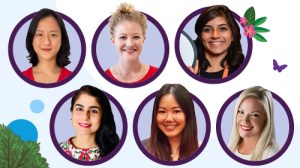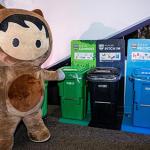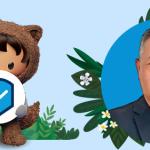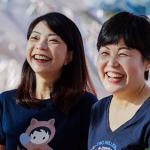Every year in early March, groups around the world take time to pause and celebrate the contributions of women for International Women’s Day. While it’s a day for sharing success stories and celebrating progress, this is also a time to reflect on and address the challenges that stand in the way of a more gender-equal world.
This International Women’s Day, individuals and businesses are encouraged to share how they are breaking gender bias. To honour the day, members of the Salesforce Women’s Network (SWN) share what today means to them, as well as what changes they hope to see in 2022.

Wendy Walker
Wendy Walker is JAPAC President, Salesforce Women’s Network and Vice-President, Marketing ASEAN.
Equality is something I have always been incredibly passionate about. As a marketer, I am naturally curious about all human beings – what makes us different, how we interact – and I love having the opportunity to be surrounded by a vast diversity of thought. Like many of us, I have had situations throughout my career where I have experienced inequality, and I‘ve seen others in the workplace experience inequality. Those moments drive me to want to do whatever I can to contribute to fixing the problem.
Our Salesforce Women’s Network (SWN) started as a grassroots vehicle for women supporting each other. It has evolved into a global, sophisticated team that brings together women and allies with a focus on nurturing and growing equality within Salesforce. I feel very privileged to have the opportunity to lead this group across JAPAC.
We aim to make all SWN activities inclusive for all employees, to ensure we can empower our allies to learn and show up as even more supportive.
We want to support everyone in the workplace, and help with guiding, mentoring and navigating to get to an outcome of equality for all.
Rebecca Haly

Rebecca Haly is ASEAN President, Salesforce Women’s Network and Director, Customer Success, APAC.
International Women’s Day (IWD) is a celebration of the female voice and female talent. It’s an opportunity to recognise those who haven’t necessarily had a voice or a platform to raise their voice. It’s also an opportunity to reflect on how far we have come in improving the equality agenda as well as a reminder of how much more there needs to be done to improve opportunities for everyone.
How do you plan to celebrate the day?
I plan on sharing my appreciation to those who inspire me, as well as connecting with the women and men who have lifted me up throughout my life and career.
I’ll also be conducting an interview for our Salesforce employees in Asia with a very talented female leader – Debbie Watkins, Co-Founder and CEO of mobile money app Lucy, will be joining us to talk about how they’re closing the financial inequality gap for female entrepreneurs.
The 2022 IWD theme is ‘break the bias’. What do you think are some effective ways to address bias in the workplace?
We all have blind spots and biases. We’re only human. But it’s important we learn to recognise them. Employee training on hiring practices and employee engagement is a great way to begin to address this. Regular training is mandatory for us here at Salesforce and it’s a foundational way to address any biases we carry when we are hiring or engaging the talent in our organisation.
Can you describe some of the changes that have inspired you on the path to gender equality, or changes you would hope to see to promote gender equality?
I would love to see attitudes and allyship improve. I’m always intrigued by the women I speak to who don’t see any issues with equality in their lives or in their workplace. That’s an incredible privilege but it’s certainly not what the data says or what experience tells us. Exercising allyship and educating ourselves around where the inequality exists for marginalised groups is important for all, and especially for those who consider that inequality and bias don’t exist.
Xinyi Li

Xinyi Li is ASEAN Vice-President, Salesforce Women’s Network and Account Executive.
IWD is a time of celebration of courage, connection, and contribution to the community!
How do you plan to celebrate the day?
As a gold facilitator for #IAmRemarkable (a 1.5-hour workshop that focuses on helping participants to understand and practice self-promotion), I will be running a workshop to help others to break bias, creating an environment where differences are valued and celebrated, not judged. And in doing so, I want to enable my participants to self-promote, to connect, and to feel empowered.
The 2022 IWD theme is ‘break the bias’. What do you think are some effective ways to address bias in the workplace?
The best way to address it is to openly talk about it:
- Don’t assume. Clarify on the spot if we are uncomfortable with a comment.
- Join events such as #IAmRemarkable or Human Library to share your personal experience of bias, your perspectives on overcoming limiting beliefs, and practical actions we can all take to help each other break bias at work and in personal life.
Can you describe some of the changes that have inspired you on the path to gender equality, or changes you would hope to see to promote gender equality?
Through my experience running multiple #IamRemarkable workshops, many women have expressed how they felt uncomfortable with self-promotion but want to do more like their male counterparts. It is definitely a muscle that needs to be built over time and I want to help more women to get started as soon as possible!
Namrata Khetrapal

Namrata Khetrapal is a SWN committee member and Global Onboarding Manager.
For me, IWD is an annual reminder to do a reality check. It’s a time of reflection for me to check if I am living up to the promises I made to myself as a woman and as an employee, to my community of women around me and at the workplace. In my previous V2MOM I had committed to creating safe spaces for women to learn and support each other (I also lead the LeanIn initiative in ASEAN) so IWD also is a perfect opportunity to renew that commitment and prioritise this goal again in the new fiscal year’s V2MOM. It’s personally important for me to know where I stand today vis-a-vis last year in terms of growing as an individual, empowering and educating myself, as well as helping other women at the workplace.
How do you plan to celebrate the day?
I will definitely be pampering myself a bit with some “me time”. I will also be reaching out to other women in my network to just send them a reminder that they should continue working on empowering themselves. I empower myself by being deliberate with my intentions to learn new skills for career progression, work on eliminating self-limiting beliefs, and having a positive outlook. I also create platforms and initiate conversations through initiatives like #IamRemarkable and LeanIn Circles within the company and outside to spark discussions around empowerment. It’s important to remind myself that once I’ve empowered myself, I should try to help another woman to realise her potential as well. We all need to pass it on!
What do you think are some effective ways to address bias in the workplace?
The very first thing we all can do is to recognise that we might have unconscious biases or might be stereotyping without realising. You can only solve a problem if you acknowledge it exists. I’m sharing some simple and practical steps that we can take in order to help ourselves in our individual capacity irrespective of our designations and roles in the company:
- Let’s not discriminate based on gender
- Let’s not attribute work skills to someone’s gender
- Let’s make work-related decisions that could impact someone’s career based only on their work and merit, not their gender or any other similar aspects.
- Let’s not judge others, especially fellow women on how they should dress, behave or not behave.
- Respect everyone irrespective of their gender.
- Create equal opportunities for growth for everyone and make conscious efforts to maintain gender parity
We do not need to wait for the organisation to take these steps for us – change starts with us!
Can you describe some of the changes that have inspired you on the path to gender equality, or changes you would hope to see to promote gender equality?
Apart from SWN, I also actively participate in other equality groups like Outforce. I like to regularly attend talks and virtual events to educate myself. I intentionally interact with women and allies from different professional fields and with those whose life journey is different from mine. It is only through education that we can empower ourselves or change ourselves for the better. By taking a simple step, starting with self reflection, to see where we are in terms of our biases and judgments today, we can really pave the way for self growth and self awareness. I also hope to see all of us support one another as we all together navigate our way to make our workplaces “bias-free”.
Tanushree Rohera

Tanushree Rohera is a SWN committee member and Solution Engineer.
I love IWD because of the conversation it sparks. I love it because it allows amazing women to learn from other amazing women, and realise that they’re not alone. And I love it because it reminds us that even though we have come a long way, we have a long way to go. For the past five years, IWD has prompted me to bring together women to understand their challenges and honestly, to face my own. Last year, for example, I worked with a TechNGO and we brought together women leaders and young working professionals. I was amazed by how different the backgrounds were but how similar the challenges were. IWD allows for these conversations.
How do you plan to celebrate the day?
The first thing I wanted to do this year was to take stock of the books I am reading and how many of them are by women authors. I read recently that we subconsciously end up reading mostly male-authored books, and I would like to balance that perspective, across genres. In terms of events, SWN has some great events lined up which I am keen to attend. I joined the UN Women’s Summit on the 4th of March and will attend the Fireside Chat with Debbie Watkins on the 8th of March. I’ll also be attending a “Be Bold” event hosted by Kearney and Stanley Black & Decker.
The 2022 IWD theme is ‘break the bias’. What do you think are some effective ways to address bias in the workplace?
Earlier this year, I came across a book called, ‘Invisible Women: Data Bias in a World Designed for Men’. This book completely changed my perspective on decision making and I would recommend it to anyone who has decision-making authority. The broad point the author conveys is that we tend to make decisions based on the data we collect and the interpretation of that data. Through multiple examples across management, healthcare, politics and product design, she proves how there exists a very real gender data gap – we either do not collect a lot of data related to women or are not disaggregating the data related to women to understand how certain decisions affect women in different ways. With this context, a few things that I would think are helpful in overcoming this bias:
- Representation in the data being collected: For every decision being made, it’s really important to re-examine the data and see if it’s broken up or disaggregated to include the holistic needs of the people who are being served. Small things like planning a team get-together over lunch vs. post work (a lot of parents find it hard to meet post-work commitments) can make a big difference in fostering an inclusive environment.
- Representation in the voices being heard: People solve problems that they are conscious of. Often we may not solve a problem, not because we do not want to, but because we did not know it existed in the first place. That’s why ensuring a decision table is composed of people who are representative of the people being served is extremely important.
- Representation in the role models shared: Gender data gaps are perpetuated in history. Often, we consider certain roles to be only for men, only because the success stories shared have largely been men. For example, did you know that the world’s first programmer was actually female? (Ada Lovelace in case you would like to look her up). And did you know that computing started as a predominantly female occupation? Learning and sharing these stories helps open up avenues that previously may have seemed too far away for a lot of women.
Can you describe some changes that have inspired you on the path to gender equality, or changes you would hope to see to promote gender equality?
For me, representation is by far the biggest driver of equality. My greatest influence towards gender equality has been representative role models. This started at home, with my mother. A trailblazer in her own right, she did not define or limit herself by gender. That mindset percolated down to my sister and me. Despite that, when I entered into the workplace as the youngest team member with tons of energy, I feared not being taken seriously. But then I met role models through work: super enthusiastic and very well-respected colleagues like Archana Ganeshalingam, a Solution Engineer in the London office, or Caroline Yam, a Program Manager in the Australia Office, and I learned to not limit myself and express that energy and enthusiasm. A few years later, seeing Jody Kohner opening All-Hands calls cemented that belief.
Representation takes different forms, but seeing someone who you can relate to succeed, especially if you are from a minority, is a very powerful kind of representation. It allows for more voices to be heard, paving the way for a more equal, representative workplace.
Clarissa Wang

Clarissa Wang is a SWN committee member and Senior Recruiting Manager, Asia.
While I’m glad that we have a “dedicated” international women’s day, it’s one of those things that isn’t just subject to the day, like Valentine’s Day. IWD to me is the icing on the cake, a platform to promote a cause that should be top of mind for everyone every day.
How do you plan to celebrate the day?
I have a toddler son, and I plan to introduce the concept of IWD to him. He probably will not really understand, but I have been intentional in introducing concepts of equality (everything boys can do, girls can do as well), trying to break the cycle of gender stereotypes (boys can’t play with dolls, etc.), and teaching consent (no means no and I will stop).
The 2022 IWD theme is ‘break the bias’. What do you think are some effective ways to address bias in the workplace?
I think breaking the bias comes from the top. It takes vulnerability from both genders to normalise topics such as mental wellness, family time, etc. As a people leader, I always emphasise the “success from anywhere” values. I encourage walking (camera off) meetings – I dial in to calls when I’m dropping off or picking up my son. I feel if I normalise doing these #parentthings, my team will be encouraged to do the same. It’s great to hear from senior leadership about how they balance family and work. I think breaking the bias is also advocating for female advancement in the workplace. So that we can see that it CAN be done.
Can you describe some of the changes that have inspired you on the path to gender equality, or changes you would hope to see to promote gender equality?
I think I have learned early on in my leadership journey that women find it more uncomfortable to share their achievements, and I found the #IamRemarkable training to be pivotal in how I think about this – it’s not bragging when it’s based on facts. Because I work in recruitment, I see the need for female leaders in the industry. My ideal future would be one where job descriptions are welcoming, not intimidating; where women dare to try even though they may not fit 100% of the criteria; that hiring teams have courageous conversations about transferrable skills vs non-negotiable competencies; and that we see more diverse faces in leadership positions so that we too can dream to “be like them when we grow up”.
Here at Salesforce, we believe equality should be a core value of every business. To learn more about how we’re working to make the world a more equal place, visit our Equality for All page here.




























